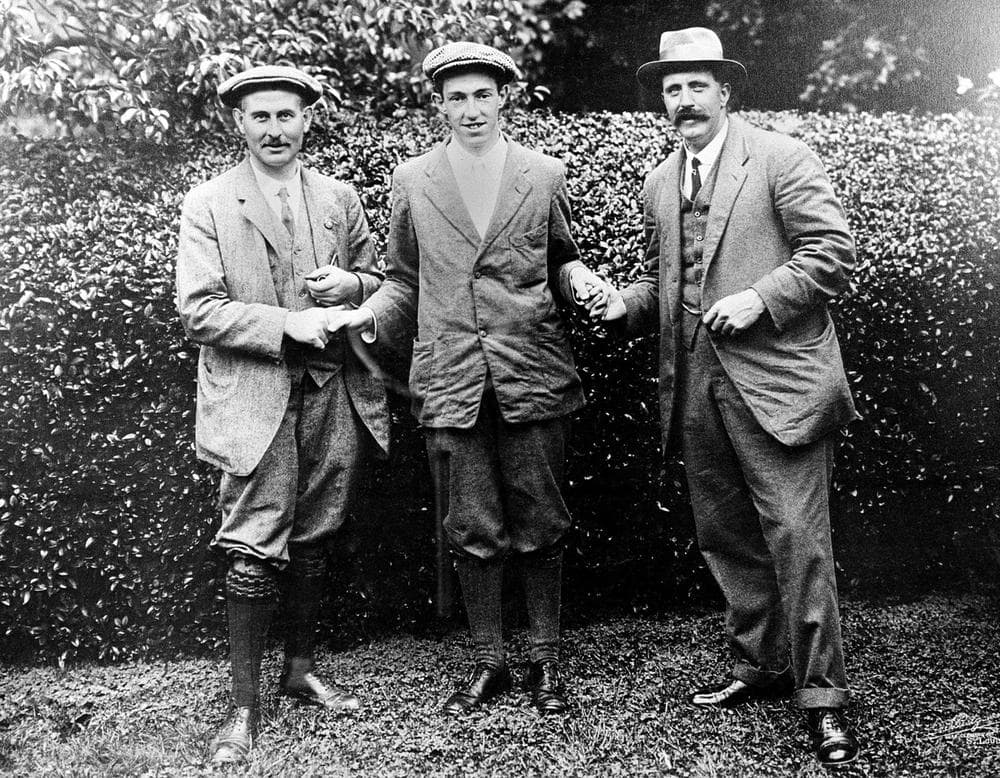Advertisement
A Rare Glimpse Inside The Gates At Brookline's Golf Mecca
Every generation or so, The Country Club in Brookline, Mass. opens its doors to the general public, showcasing its beauty to the masses and offering a reminder of the very special place it holds in the history of American golf.
This week, for the 16th time, The Country Club is hosting one of the United States Golf Association’s marquee events: the 113th U.S. Amateur. The tournament is being held on the 100th anniversary of what surely was the “shot heard ‘round the world’’ in American golf: the 1913 U.S. Open victory of Francis Ouimet.
Ouimet, a 20-year-old caddie at the club, beat the two best players of his time, Englishmen Harry Vardon and Ted Ray, in an 18-hole playoff. His improbable win — think of a scratch player at your club beating Tiger Woods and Phil Mickelson — put golf on the front pages of American newspapers. Within a decade, the USGA estimates that the number of golfers in the country went from 350,000 to nearly three million.

Mike Trostel, the USGA’s senior curator and historian, said of Ouimet’s win, “it changed the complexion of American golf.”
The Country Club opened in 1892, introduced golf a decade later, and hosted its first USGA event, the U.S. Women’s Amateur, in 1902. The club is one of the five original founding clubs of the USGA.
Since that Women’s Amateur in 1902, the club also has hosted three U.S. Opens, all of which ended in playoffs. It hosted two more Women’s Amateurs, the last being in 1995. This year’s Amateur is the sixth at the venerable tract and the first since 1982. The Walker Cup, an amateur competition between the United States and Great Britain and Ireland, has been held twice at The Country Club. And the Ryder Cup, a PGA event as opposed to a USGA event, was held in 1999, providing what at the time was the greatest comeback in the competition’s history.
Through all the competitions at the club, one surprising factoid has emerged: no foreign player or team has won. Vardon won six British Opens, but he and Ray, the defending British Open champion, came up short. Englishman Nick Faldo lost in a playoff to Curtis Strange in the 1988 Open. The European Ryder Cup team was overwhelmed in the singles matches on Sunday and blew a big lead.
Foreign-born players have had no trouble winning at Merion, outside Philadelphia, which is the only club to hold more USGA tournaments than The Country Club. England’s Justin Rose won the U.S. Open there in June. Australian David Graham won the same tournament in 1981. Italy’s Edoardo Molinari won the 2005 US Amateur at the course.
The Country Club’s reputation as being kind to Americans could finally end this week. Nineteen countries were represented at the start of the tournament. When the round of 32 began Thursday, six of those countries still had competitors in the tournament, including Malaysia, Denmark and Austria. The stroke play co-medalist, Neil Raymond, was one of four Englishmen to make it to the round of 32. There also were four Canadians and three Australians.
The U.S. Amateur has long been the purview of the top college players — many of the foreign-born players attend United States’ colleges — as exemplified by the average age of the competitor: 22. The age gap ran from a 14-year-old to a 59-year-old, the latter, David Szewczul, being the only player in the field to also have played in the U.S. Amateur when it was last held at The Country Club.
But The Country Club can surprise as well. Jay Sigel was perhaps the United States’ finest amateur golfer over the last half-century. He had participated in 14 U.S. Amateurs when he arrived at The Country Club in 1982. He was 38. He had won a British Amateur. But the tournament he wanted the most had eluded him, no more painfully so than five years earlier, when he lost in the semifinals at his home course outside Philadelphia.
Unbelievable! I realize that's no description at all, but that's the best I can do.
Jay Sigel, after winning the 1982 U.S. Amateur
Sigel’s drought ended at The Country Club after he crushed another hot-shot collegian in the finals. He was close to tears at his final news conference, saying, "Unbelievable! I realize that's no description at all, but that's the best I can do. I just think this championship means something more to some who'll always be an amateur than to someone who'll be a pro in a year or two. To someone like me."
There’s no Sigel in this tournament. There may never be another one like him. There’s no Woods or Mickelson, either, at least not now. But someone will emerge on Sunday to claim the championship and, a few years down the road, he might even make a name for himself on the PGA Tour.
Whoever it is will join a list of elite players — Ouimet, Sigel, Strange, Julius Boros — to have triumphed at The Country Club. That only seems fitting for a course and club that has such an important place in the history of golf.
Related:
This program aired on August 16, 2013. The audio for this program is not available.